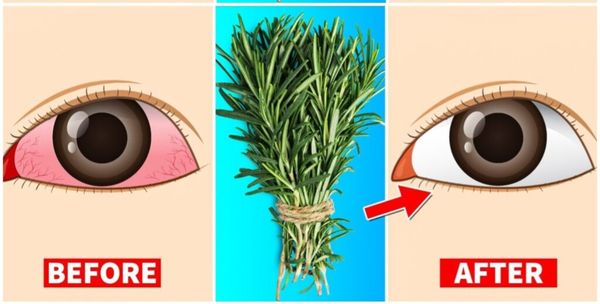In today’s screen-dominated world, it’s more important than ever to take care of our eyes. As the windows to the soul, our eyes play a vital role in our daily lives and connection to the world. Unfortunately, things like excessive screen time and unhealthy lifestyles can negatively impact our vision. But fear not! In this article, we’ll explore the incredible power of nature and how herbs can contribute to maintaining and enhancing eye health.

Herb 1: Bilberry
Let’s start with bilberry, a potent herb packed with health-boosting anthocyanins. These compounds act as powerful antioxidants, safeguarding our eyes from harmful free radicals. By preventing damage that can lead to age-related eye conditions, bilberry helps maintain our vision. Research even suggests that bilberry may improve night vision and overall visual acuity by enhancing blood flow to the eyes. This natural remedy ensures that our eyes receive essential nutrients and oxygen.
Herb 2: Ginkgo Biloba
Ginkgo Biloba, also known as the maiden hair tree, has a rich history in traditional Chinese medicine. Not only does it offer cognitive benefits, but it also supports eye health by enhancing blood flow. By improving circulation, Ginkgo Biloba ensures that nutrients and oxygen reach the intricate blood vessels within our eyes. Some studies even hint at its potential to manage conditions like glaucoma. Additionally, its antioxidant properties protect our eyes from oxidative stress.
Herb 3: Saffron
Let’s take a moment to appreciate saffron and its vibrant threads. This herb contains powerful antioxidants, especially crocin, which neutralize harmful free radicals that can damage our ocular tissues. By doing so, saffron offers protection against age-related macular degeneration and retinal degeneration. Ongoing scientific studies explore the potential of saffron in improving visual acuity and sensitivity to light.
Herb 4: Turmeric
Turmeric, with its bioactive compound curcumin, addresses inflammation and oxidative stress associated with various eye conditions. It’s particularly beneficial for managing conditions like dry eye syndrome that cause discomfort and vision problems due to inflammation of the ocular surface. The antioxidant properties of turmeric contribute to the overall health of our retinas, protecting against oxidative stress.
Herb 5: Rosemary
Rosemary, rich in antioxidants like rosmarinic acid and carnosic acid, offers vital protection against oxidative stress to our ocular tissues. Its anti-inflammatory properties make it an excellent herb for maintaining eye well-being. Rosemary’s positive impact on blood circulation indirectly influences eye health, while its aromatic compounds may help reduce eye strain caused by extended periods of visual tasks.
Herb 6: Dandelion
Dandelion, a nutrient-rich herb, is a true champion for eye health. It provides essential vitamins and minerals that are crucial for maintaining optimal vision. The vitamin A content in dandelion supports low-light and color vision. Additionally, vitamins C and E contribute to the antioxidant defense system of our eyes. The presence of lutein and zeaxanthin in dandelion leaves acts as antioxidants, shielding our eyes from harmful light waves. Finally, dandelion’s detoxifying properties indirectly contribute to clearer vision by reducing the burden on our eyes.
Herb 7: Fennel
Last but not least, let’s talk about fennel seeds. Packed with vitamins, minerals, and antioxidants, fennel seeds offer significant benefits for our eye health. The beta-carotene in fennel seeds provides our retina with much-needed vitamin A, supporting its overall function. Meanwhile, antioxidants neutralize free radicals, offering protection against oxidative stress. By including antioxidant-rich herbs like fennel in our diet, we take a promising step towards natural eye care.
While these herbs indeed offer promising natural remedies, it’s important to maintain a balanced lifestyle for optimal eye health. Proper nutrition, regular exercise, adequate rest, and eye checkups all play integral roles in caring for our eyes. It’s also essential to practice good eye hygiene by taking regular screen breaks and wearing UV-protective sunglasses. And of course, before incorporating any herbs into your daily routine, it’s important to consult with healthcare professionals to ensure safety and appropriateness for your individual needs. Because when it comes to your eyes, nothing but the best care will do. Let nature be your ally on the journey to optimal vision!




